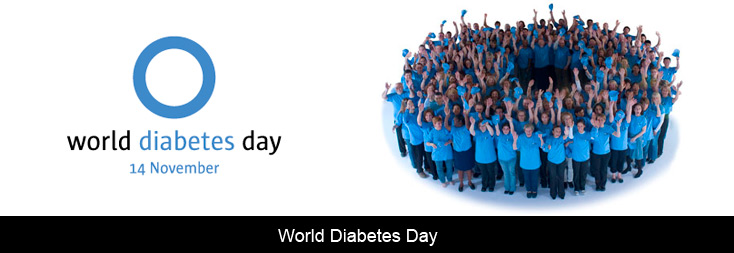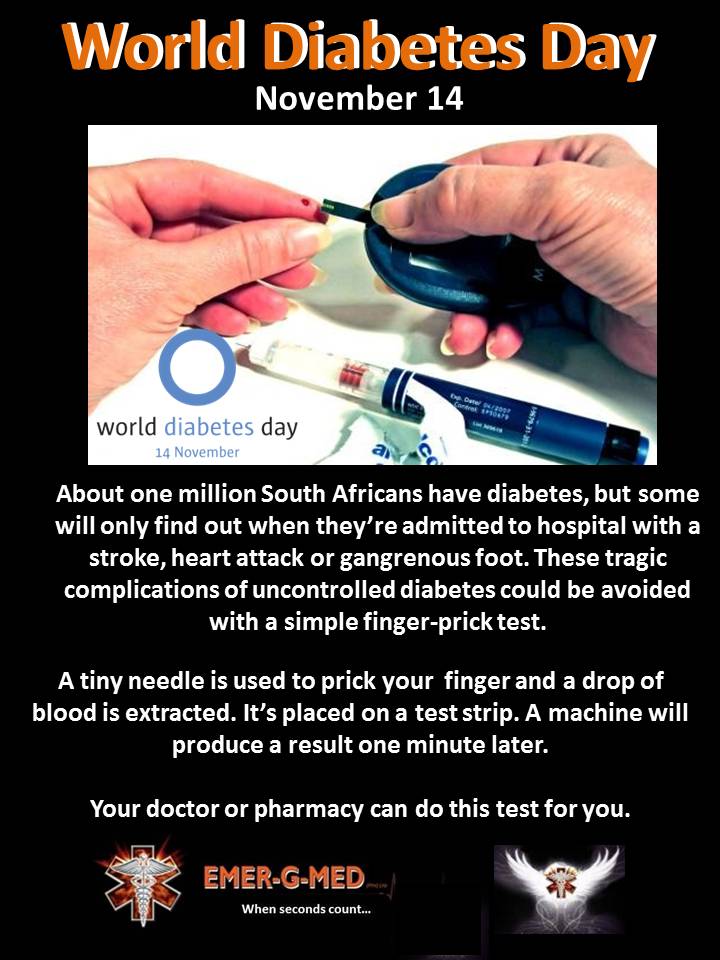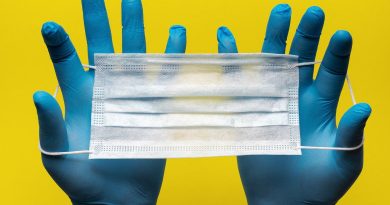November 14 is World Diabetes Day
About one million South Africans have diabetes, but some will only find out when they’re admitted to hospital with a stroke, heart attack or gangrenous foot. These tragic complications of uncontrolled diabetes could be avoided with a simple finger-prick test.
World Diabetes Day aims to increase an awareness of the effects of diabetes and its complications to the population. It is also hoped that the increased awareness will lead to more resources to fight the causes of diabetes and help fund research into improved treatment options.
On Wednesday November 14, 2012 EMER-G-MED Centurion Operations will be at the Brooklyn Police Station to test SAPS officers. Members of the community are invited to join the EMER-G-MED team and SAPS between 11am and 1pm to have their blood sugar levels tested. A big thank you to Roche for sponsoring the test strips, as there is a set amount so ensure to get there early in order to be tested.
About Diabetes
Diabetes is a chronic medical condition in which your body is unable to produce or respond to the hormone insulin. Insulin is produced by the pancreas, which controls blood sugar (glucose) levels and allows the body to use blood sugar by entering into the little cells that need fuel or energy.
When your blood sugar levels are high, your pancreas churns out insulin and when your sugar level is low it blocks production. Without insulin, glucose from your diet simply floats around in your bloodstream causing all sorts of problems while your cells starve from a lack of fuel.
The longer your diabetes goes undiagnosed and untreated, the longer rampant uncontrolled damage is taking place. Untreated diabetes will also lead to a whole range of unpleasant side effects like dizziness, tiredness, poor concentration and work performance as well as increased urination. The sooner you test, the sooner you can feel normal again.
Know what screening involves
Testing for diabetes is very simple. It involves a finger prick test.
A tiny needle is used to prick your finger and a drop of blood is extracted. It’s placed on a test strip. A machine will produce a result one minute later.
You can also be tested for diabetes at a pharmacy or by your Doctor.
Understanding what your results mean
An extremely high blood sugar level is cause for alarm and your doctor may admit you to a hospital.
If your result is simply very high or high and you do not appear to be imminently expiring, your doctor will send you to the laboratory the next morning for a fasting blood glucose test or an oral glucose tolerance test.
A high glucose on a screening test indicates a high probability that you have diabetes, but a laboratory test will need to confirm the diagnosis.
Everyone should be tested regularly for diabetes. More specifically, you should be having yearly life-long screening (from as young as 10 years of age) if you have the following risk factors for diabetes:
- If you are overweight (defined by weight-and-height chart tables for children and a body mass index of more than 25 for adults)
- If you have diabetes-associated conditions like high blood pressure, polycystic ovarian syndrome, high cholesterol, vascular disease for example heart attack and stroke
- If diabetes runs in the family like parents or siblings with diabetes
- If you have ever had an abnormal glucose test that means you have impaired glucose tolerance or pre-diabetes
- If you have ever been diagnosed with diabetes during pregnancy or given birth to a baby weighing more than 4kg.
If you don’t have any risk factors for diabetes, you should start screening every two to three years from the age of 45 years. You should also see your doctor as soon as possible for screening if you have symptoms of diabetes such as increased urination, increased thirst, unexplained weight loss, tiredness, dizziness or blurred vision. There is no harm in screening for diabetes: it’s far more dangerous not to test.
Diabetes is a common and serious condition, but screening is simple and accessible. If you can’t be there on Wednesday be sure you get yourself down to your GP or pharmacy for a diabetes screening.
Also view:






